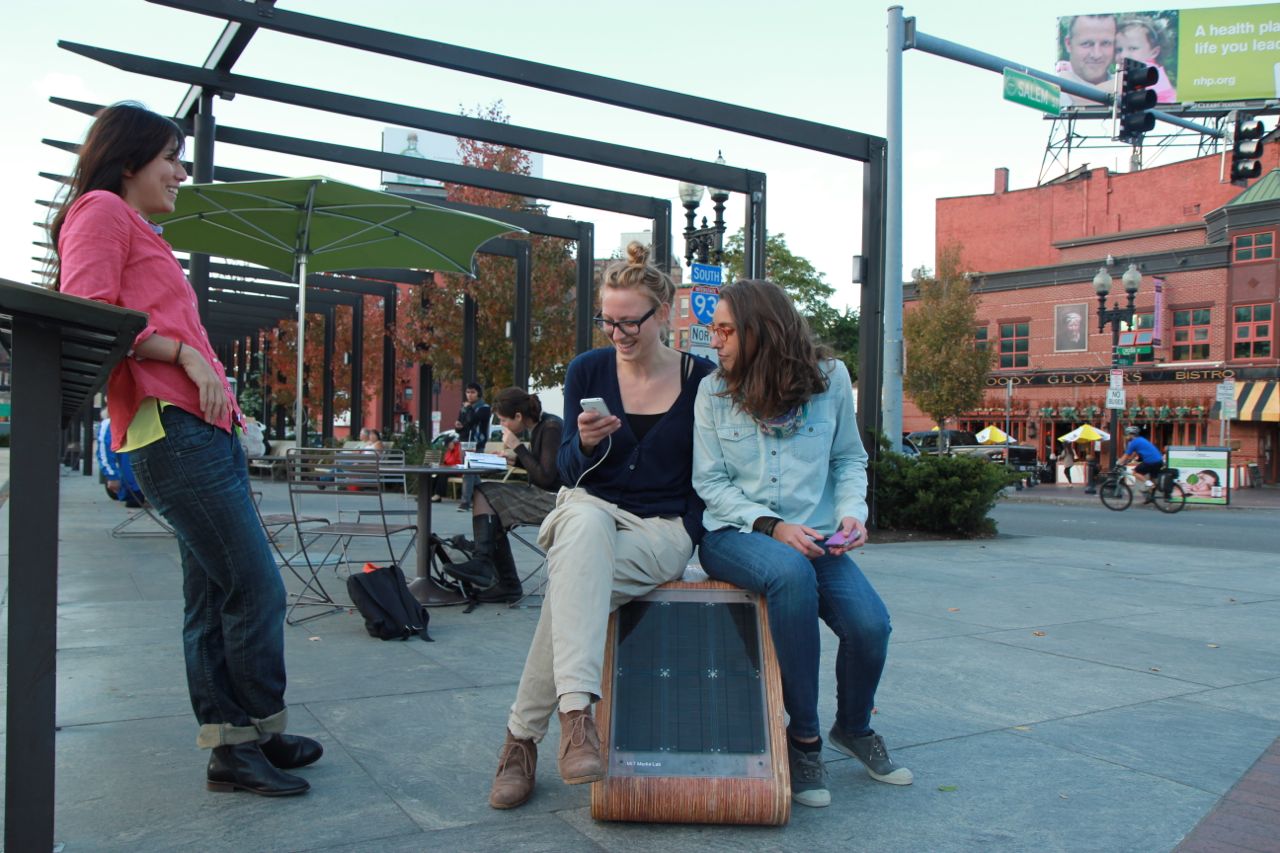
News from the City of Boston and Greenway Conservancy:
seat-e: Solar Powered Seats Installed on the Greenway
Boston Charges Up Before the Winter Comes
Mayor Thomas M. Menino today announced that two prototypes of seat-e–a solar-powered seat with the capability to charge smart phones–were installed in the Rose Kennedy Greenway in Boston’s North End. The project was developed at the MIT Media Lab.
The pair of seats will provide city dwellers with a source of renewable energy to charge their phones and allow users to interact with imbedded “social lights,”’ which shift colors based on the use of the seats. Future versions of seat-e will include air quality sensors to measure smoke, exhaust and odor. The data collected will be available to the public.
“The City is interested in continuing to explore how technology can be integrated into the streetscape, whether it be a convenient place to charge your phone, a new way to engage with the public, or an innovative way to collect environmental data,” said Kris Carter, adviser to Mayor Menino. “seat-e is a small example of how our curbsides are getting smarter and our streets are becoming more complete.”
Designed and built by MIT alumna Ines Gaisset, Media Lab Visiting Scientist Sandra Richter, and Media Lab PhD candidate Nan Zhao, seat-e is an essential building block for the mobile infrastructure of 21st century cities in a time where more than half of the global population lives and works in a city. The team is enthusiastic about the installation, and excited to see city residents and visitors using seat-e in Boston.
Together with the Rose Kennedy Greenway Conservancy and the City of Boston’s Mayor’s Office of New Urban Mechanics, the researchers want to investigate smart urban furniture as a sensor network platform that provides multiple benefits to city residents. The solar benches will be in place for the remainder of the fall for study, and will reappear in the spring with any necessary improvements. seat-e was showcased at the World Innovation Forum in New York City at the beginning of the year, and was part of the discussion at the Design Exchange Boston panel “The New Urban Environment: Smarter. More Connected. Better Designed.”
This project is a collaboration between two Media Lab research groups: Changing Places, headed by Principal Research Scientist Kent Larson, and Responsive Environments, headed by Professor Joseph Paradiso. Researchers in both groups are focusing on how to help city residents and local governments address the challenges of better utilization of urban social spaces, improved communication, innovative energy use, and reduced pollution.
Paradiso, who is pioneering advanced work in sensor technology, explains that seat-e is a great example of how sensors can piggyback onto simple devices used for other purposes to measure many parameters for various applications. Larson emphasizes the need to apply the most current technological innovations to reinventing tomorrow’s cities so that they are both more livable and sustainable.
About Boston Complete Streets & The Streetscape Innovation Fund
The City of Boston recently released its latest version of the Complete Street design guidelines (www.bostoncompletestreets.org) with a strong focus on being green, smart, and multimodal. Boston Complete Streets policy continues to balance our streets for all road users, making it as safe and convenient for pedestrians, cyclists, and transit users as it is for those in a car. This latest edition thinks beyond just “multimodal” and incorporates “green” and “smart” components into the streetscape, a unique approach in this realm. To experiment with approaches to design and build complete streets, the Mayor’s Office of New Urban Mechanics developed the Streetscape Innovation Fund. This fund supports projects that integrate new technology and human-centered design into traditional roadway infrastructure. In 2013 a broad range of projects, from parklets to interactive public art, have been made possible by fund’s approach to rethinking our largest public space – the streets.
About the Rose Kennedy Greenway Conservancy
The Rose Kennedy Greenway is a mile-and-a-half of contemporary parks in the heart of Boston. The Greenway, a roof garden atop a highway tunnel, connects people and the city with beauty and fun. The non-profit Conservancy maintains, programs, and improves the Greenway on behalf of the public and in partnership with the Commonwealth of Massachusetts.
###



